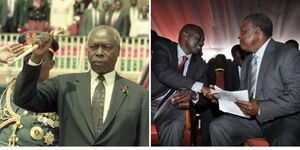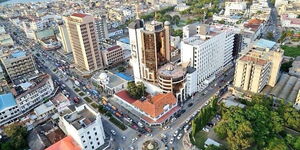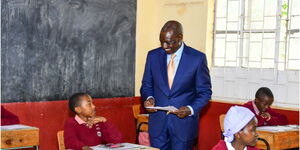President Uhuru Kenyatta has raised concerns over the rate at which developing countries that form the Organization of the African, Caribbean and Pacific States are amassing debt.
Kenyatta identified the growing debt burden and existing economic sanctions among its members as challenges that are aggravating the negative effects of the Covid-19 pandemic.
The head of state addressed the virtual summit on Wednesday, June 3 as the organization's President-in-Office. Kenya is a member state of OACPS.
"The debt of many member states continues to rise. Forty-four (44) per cent of low income and least developed countries (LDCs) are in debt distress or assessed as being at high risk of external debt distress," President Kenyatta highlighted.
"Covid-19 and related global economic shocks will exacerbate this problem. At the national level, Covid-19 has led to a shrinking of fiscal space while at the international level, the pandemic has weakened the pipeline of resources dedicated to the development programme," he added while noting that East African countries were facing more woes characterised by floods and the locust invasion.
The ACP leaders, amongst them President Cyril Ramaphosa (South Africa) Paul Kagame (Rwanda) and Edgar Lungu (Zambia) welcomed the various debt relief measures being rolled out by global lenders but called for more interventions including debt cancellation.
"In Africa, our economic growth is set to decline from 2.4% in 2019 to between -2.1 and - 5.1% in 2020. It is estimated that OACPS countries will require between Ksh 5-6 trillion to meet their international debt obligations.
"This is a challenging time for all of us. If one of us fails, all of us fail," Kenyatta rallied.
In April 2020, Kenya shunned the opportunity to delay debt repayments through the end of the year, as a measure to cushion against the effects of the Covid-19 pandemic.
Treasury CS Ukur Yattani, in an interview with Reuters, on Friday, May 15, argued that the debt relief may negatively impact the country's credit rating. 20 major economies in the world (G20) had opted to help lesser-developed countries mitigate the pandemic by temporarily waiving loan repayments.
"We fear we might unnecessarily create a crisis," Yattani stated.
In May 2020, Moody's, a US credit rating agency warned Kenya against taking more loans. Moody's revised Kenya's credit rating outlook to negative, signalling that its next review could rate Kenya much lower if the situation prevails.
It also warned that the rating meant Kenya was flagged as a country that can easily default loans, which may have an impact on Kenya's borrowing ability moving forward.
However, despite the warning, Kenya proceeded to secure a $1 billion (Ksh106.7 billion) loan from the World Bank. The loan became the largest Discounted Payoff (DPO) that World Bank has granted the country.












